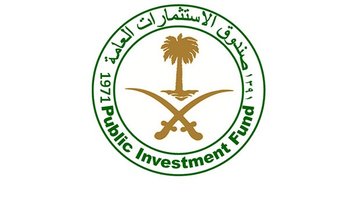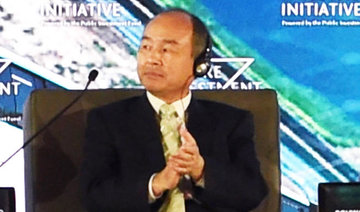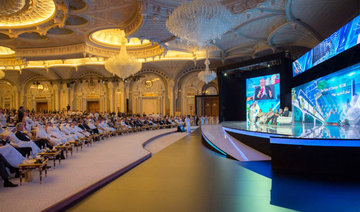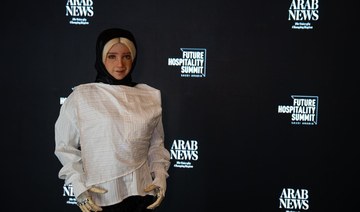New York: As the clocks ticked to midnight in New York’s Plaza Hotel, Yasir Al-Rumayyan was nearing the end of a busy day in a hectic week. But there was one event he simply had to attend, mainly because it might just involve the complete transformation of the renewable energy industry.
In the luxurious hotel’s corridors, just outside the Monroe Suite, the managing director and chief executive of Saudi Arabia’s Public Investment Fund was waiting, along with a watchful security contingent and an expectant media pack, for the arrival of Crown Prince Mohammed bin Salman and an announcement that everyone had been assured was “big.”
Al-Rumayyan shook some hands and took some congratulations on the successful interview he had done that afternoon with Maria Bartiromo, the anchor for Fox Business Network TV channel. He looked tired, but accomplished.
In that interview, he had once again committed PIF to becoming a “global investment powerhouse” with a staggering $2 trillion in assets under management by 2030, and when the small crowd of journalists and cameramen were shown into the presentation suite, it was obvious that the next phase toward achieving that ambition would begin that very evening.
Al-Rumayyan stood locked in contemplation alongside Khalid Al-Falih, the Saudi minister of energy, as the Crown Prince and Masayoshi Son, the founder and chief executive of Japanese hi-tech finance house SoftBank, unveiled an agreement to put Saudi Arabia, and PIF, in charge of the biggest investment ever in solar energy.
The $200 billion investment in the sun-rich Kingdom could give Saudi Arabia the impetus to lead the development of renewable energy from solar power, boost the economy with growth and thousands of jobs, and save it $40 billion a year in energy bills.
It was exactly the kind of transformational deal he had described earlier that day. “We want to enable new sectors and new industries, and make them more practical. Some of the new ideas are really great ideas, but they are not practical,” he told Bartiromo.
Just a few years ago solar energy might have fallen into the “not practical” category, but — with PIF and SoftBank’s investment — it might just be reaching the tipping point of practicality. This was what he had meant when he said: “We want to present new opportunities to reshape the global economy.”
Al-Rumayyan has been chosen as the man at the sharp financial end of the ambitious Vision 2030 strategy to transform the economy of Saudi Arabia away from oil dependency. His education in Saudi Arabia was rounded off at Harvard Business School, and the top job at PIF came after various roles with Saudi financial institutions and market authorities.
He was made managing director and chief executive of PIF just a few months after the Crown Prince took charge of the once-sleepy pensions arm for the Saudi government, and began to change it radically.
“The Crown Prince is a great visionary and he looked at the things that he thought we should be looking at, and I agreed with him totally,” said Al-Rumayyan.
Virtually everything has changed at PIF since then. It has a new ambition: To be the biggest single investor in the world measured by assets under management. It has a new investment strategy: To invest in the future. And it has a new corporate culture: To hire the best and the brightest investment minds from around the world to implement the Vision 2030 strategy.
On the first target, he mapped out how PIF would get to the $2 trillion level by 2030. “A year ago, we had $150 billion assets under management. Last September that stood at $250 billion … By 2020 we should be $400 billion and by 2030 we should be $2 trillion. So how we achieve the target is, of course, challenging, but it’s very much doable,” he said.
PIF’s Vision Realization Program commits it to higher performance targets for the 80-odd companies, of which about 20 are quoted, that are in its biggest pool of assets, the Saudi domestic funds. These had been delivering a return of 3 percent, but this has already increased to between 4 and 5 percent, Al-Rumayyan said.
“We were previously a passive investor, but now we’re more active,” he added.
The second way to help get to the $2 trillion figure is via the use of funds from the government in the form of cash from the enormous sell-off of government companies set to begin soon. “The government will keep investing capital via the proceeds of the privatization program. That is another good way to increase our assets under management,” he said, pointing out that PIF was not obliged to pay anything back to the government in dividends.
That pot would include the proceeds from the forthcoming initial public offering of Saudi Aramco, billed as the biggest single IPO in history. “So that’s a minimum of maybe $100 billion coming to us, maybe more, not depending on the valuation only, I would say, but on the size of the IPO we’ll be offering,” he said.
The third technique to get to the $2 trillion goal is through the new, aggressive investment strategy PIF has adopted under Al-Rumayyan. He reeled off a list of the biggest investments made in the past couple of years: Uber, SoftBank Vision Fund (the $100 billion hi-tech investment fund set up and managed by the Japanese bank with a $45 billion PIF investment), Blackstone, and the latest — Magic Leap, the Californian developer of “mixed reality” technology, which he called “really, a great company.”
“All these have outstanding growth rates. They are very disruptive and will add a lot of value to our portfolio,” Al-Rumayyan said.
“So, add it all up, and the $2 trillion is a conservative estimate,” he judged.
Not much else about the new PIF can be called conservative. The partnership with the hi-tech Vision Fund is central to the strategy. “Traditionally our historical portfolio was in Saudi equities and fixed income with low or even negative returns. It was all in conventional investments.
“But we see new trends coming to the future want to invest in the future, like robotics and even autonomous cars. It’s coming, it’s here. I know we had an incident recently (the fatal accident with an autonomous Uber vehicle in Arizona, US) but it’s one incident out of 30 million hours of test driving. In the grand scheme it’s really a fraction of a fraction of a percentage,” he added enthusiastically.
Data sciences will also be a focus of the new PIF strategy. “With the Internet of things, everything will be talking to everything else and the amount of data will be unprecedented. People will know what you’re buying, what you’re doing, your preferences even without you knowing about it,” he said.
Medical investment will also be to the fore. “If we’re going to have prosperity people are going to need to have greater lifespans and ages. All these things will be the focus of our investments. In addition to the greater impact it will have on our life, it is going to be lucrative,” Al-Rumayyan said.
PIF has not given up entirely on conventional investment. Al-Rumayyan pointed to the recent stake in AccorHotels as an example of investment in a fast-growing conventional business, but a much bigger focus is on infrastructure, via its $20 billion share of Blackstone’s $40-$50 billion US fund for US infrastructure.
“It needs to be upgraded. So we created the largest fund in the history of infrastructure investment. It will close in the coming month or two, and then we can start work. Streets, bridges, pipelines, tunnels, even airports — all need to be upgraded in the US and internationally. With the political will we have from the administration I think it’s a really good opportunity for us to be here,” he said.
And, of course, there are the huge infrastructure investments under way back home in Saudi Arabia. PIF is running three of the big “giga projects” — the Neom development, the Red Sea Resort and the Al Qidiya leisure complex outside Riyadh.
“Giga projects are excellent investment ideas. The growth rates in the Saudi economy will be really great and bigger than the past five years,” he said.
Managing these projects presents a challenge for PIF, which just a couple of years ago had a staff of only 40. Now, Al-Rumayyan said, it employs 240, expected to rise to 480 by the end of the year, with new offices planned in the US, London and Tokyo. This is in addition to the large number of investment bank advisers and consultants PIF uses.
One of the challenges, he said, lies in finding the right people to partner with, which he compared to being an orchestral conductor. “Sometimes the biggest challenge is to get people to play together,” he said.
But he is convinced that the world can be persuaded of the opportunities presented by the new-look Saudi Arabia.
“It is one of the most stable states in the region with 100 years of track record. Look at some of the countries around us. Some other states attract FDI but are less stable than Saudi.
“You have the history, you have the infrastructure, you have the rules and regulations, you have the enforcement of the law, especially if you look at what we’ve been doing lately with the war on corruption. We’re trying to pave the way for anybody to come in and feel comfortable that they know what it is they’re getting themselves into,” he added.
He is also convinced that the bold new Saudi world has the support of most people in the Kingdom. “Of course there is change, but it is all about positive changes and most of the people in Saudi Arabia want that. Now we’re seeing it and now we all want to participate in it. The year 2018 will be a great year for us and I think we’ll see a lot of good things,” he said.
‘A new force shaping the future of the global economy’: Saudi Arabia PIF chief
‘A new force shaping the future of the global economy’: Saudi Arabia PIF chief
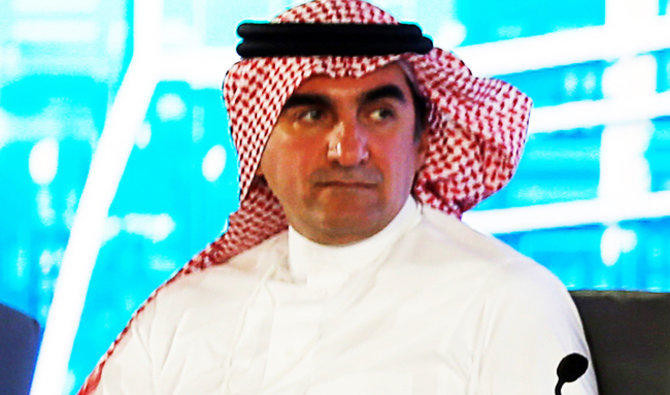
- $200 billion investment in KSA could give Saudi Arabia impetus to lead development of renewable energy from solar power
- Yasir Al-Rumayya has mapped out how PIF would get to the $2 trillion level by 2030
Saudi energy minister lauds growing economic ties with Uzbekistan

RIYADH: Saudi Arabia and Uzbekistan’s economic cooperation models reflect mutual commitment to prosperity through shared goals in the two countries’ 2030 plans, said the Saudi energy minister.
During the main dialogue session of the third Tashkent International Investment Forum, Prince Abdulaziz bin Salman emphasized the distinguished relations between the two nations and the commitment of their leaderships to enhance and develop cooperation in all fields, particularly in the energy sector.
Uzbekistan President Shavkat Mirziyoyev also attended the meeting.
The Saudi minister pointed out that economic cooperation between the two countries serves as a model, especially in light of the “Uzbekistan 2030” strategy and the Kingdom’s Vision 2030, with their similar goals aimed at economic growth, diversification, and sustainable development, reflecting a mutual commitment to building a prosperous future for both nations, according to the Saudi Press Agency.
“The bilateral relations saw a notable advancement subsequent to a meeting between Crown Prince Mohammed bin Salman and President Mirziyoyev in Riyadh in 2022,” he said.
Prince Abdulaziz stressed the significance of the energy sector in the growing relations between the two nations, particularly in renewable energy, highlighting the substantial involvement of Saudi companies in Uzbekistan, exemplified by ACWA Power.
He elaborated on the investment flowing between the two countries in this domain, eclipsing $14 billion, with the aim of producing over 11 gigawatts of renewable energy electricity, affirming that Uzbekistan has demonstrated a serious commitment to achieving a fair and equitable energy transition, aligning with the Kingdom’s aspirations.
The energy minister further underscored the rational stances jointly embraced by both nations, placing significant emphasis on the critical aspects of energy security, development, and conservation.
He also underscored the two countries’ collaborative roles in addressing climate change through collective endeavors.
Recently, ACWA Power signed a power purchase agreement with the National Electric Grid of Uzbekistan for the Aral five-gigawatt wind power project worth SR18.2 billion ($4.85 billion).
Two weeks ago, ACWA Power announced it had secured an $80 million equity bridge loan from the Bank of China for its projects in Uzbekistan.
The Saudi entity said the fund will boost its Tashkent 200 megawatts solar photovoltaic power plant and 500 MW per hour battery energy storage system project in Uzbekistan.
“This transaction culminated the initial agreement reached during the 3rd BRF (Belt and Road Forum) summit in October 2023, where ACWA Power was represented by its chairman as a keynote speaker,” the company said in a statement.
Alvarez & Marsal opens regional headquarters in Riyadh
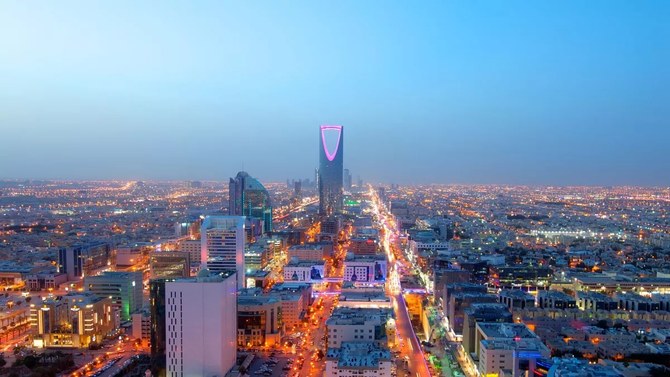
RIYADH: Underscoring international confidence in the Saudi economy, global consulting firm Alvarez & Marsal has become yet another company to have opened its regional headquarters in Riyadh.
In a press statement, the US firm stated that the inauguration of the new regional headquarters underscores its commitment to contributing to the country’s transformation agenda.
“As the company continues to deepen its roots in the country, with expertise across various sectors — from banking and tax to healthcare and disputes and investigations — this strategic move aims to leverage local insights in the Kingdom to drive sustainable growth and innovation.” the company said.
Additionally, A&M announced that it has included 13 skilled Saudi graduates in the inaugural batch of its Bidayah Graduate Program.
The company stated that these candidates were selected from a competitive pool of applicants, describing the chosen individuals as representing the bright future of the Kingdom and reflecting the potential that A&M sees in local talent.
James Dervin, managing director of A&M in the Middle East and co-head in the region, stated that the program is designed to develop the next generation of execution-focused leaders in management consulting. It is guided by the A&M principles of leadership, action, and results.
“Over the course of 12 months, participants will undergo rigorous training, engage in live project work, and receive mentorship from seasoned industry experts,” he said.
Dervin added: “Coupled with the incorporation of our regional headquarters in Saudi Arabia, the program underscores A&M’s commitment to investing in the professional development of Saudi nationals and aligning with the Kingdom’s ambitious Vision 2030,”
He further noted that the new graduates will have a significant, positive impact on his firm and the clients it serves.
Commenting on the close alignment of A&M’s global brand with the local market dynamic in Saudi Arabia, Bryan Marsal, A&M’s CEO and co-founder, said: “The all-encompassing nature of the Saudi Arabian transformation is driving significant demand for A&M’s distinctive ‘get-stuff-done’ brand of services — for our ability to fix problems, our ‘skin in the game’, and our freedom from audit conflicts.”
With over 9,000-strong workforce across six continents, A&M generates tangible results for corporations, boards, private equity firms, law firms, and government agencies grappling with intricate challenges, according to its website.
More than 180 major global companies and organizations have already established regional headquarters in the Saudi capital. These include Apple, Microsoft and Alibaba, as well as the IMF, IBM, and Google.
Other notable entities on the list include German consultancy firm TUV Rheinland, PwC Middle East, Aramex and Amazon.
UAE banks’ aggregate capital, reserves exceed $136bn
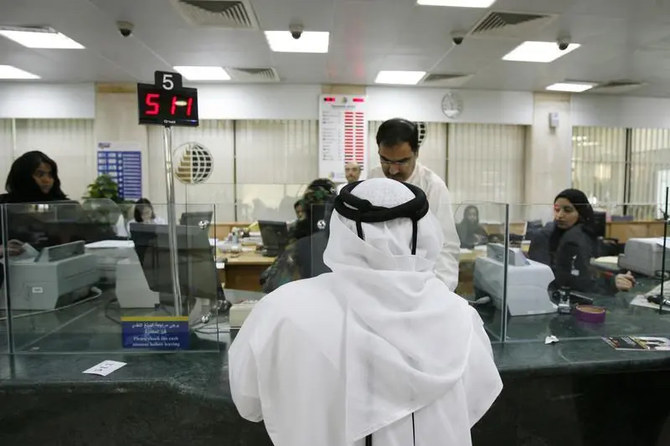
RIYADH: UAE-based banks’ aggregate capital and reserves reached 501.5 billion dirhams ($136 billion) at the end of February, up 14.4 percent year-on-year, according to new data.
The latest statistics from the Central Bank of the UAE showed that on a monthly basis, the total capital and reserves grew 0.95 percent, reflecting an increase of approximately 4.7 billion dirhams, according to the Emirates News Agency, also known as WAM.
This rise in figures falls in line with the central bank’s goal of enhancing monetary and financial stability in the country.
Moreover, the data indicated that national banks accounted for around 86.5 percent of the aggregate capital and reserves of banks operating in the UAE. At the end of February, they recorded a total of 433.7 billion dirhams, an annual rise of 14.6 percent.
On the other hand, the share of foreign banks settled at 13.5 percent, hitting 67.8 billion dirhams at the end of the same month, reflecting a 13.2 percent surge compared to the same period a year earlier.
Furthermore, at the end of February, the total capital and reserves of banks operating in Dubai alone stood at 246.4 billion dirhams, logging a year-on-year growth of 15.1 percent.
Additionally, banks operating in Abu Dhabi recorded around 217 billion dirhams, up 13 percent from the corresponding period in 2023.
Meanwhile, the cumulative capital and reserves of banks operating in other emirates combined reached an estimated 38.1 billion, reflecting a 15.5 percent climb in comparison to the same period a year prior.
In March, a top executive at Roland Berger said that UAE bank branches were witnessing the highest revenues in the region, amounting to $18.6 million per branch.
This was driven by the nation’s digital transformation, which enabled financial institutions in the Gulf Cooperation Council to reduce the number of banking branches by 328 within three years, Saumitra Sehgal, the global consulting firm’s head of financial services in the Middle East, told WAM, at the time.
Sehgal also pointed out at the time that the number of bank branches across GCC nations decreased from 4,067 at the end of 2019 to 3,739 by December 2022.
He further noted that banks in the UAE saw the highest number of outlets merge and reduce with the support of digital transformation between 2019 and 2022.
Saudi financial robo-advisory firm Abyan Capital secures $18m in funding
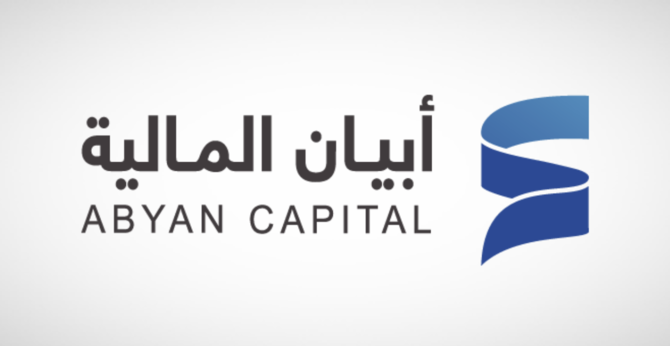
RIYADH: Financial robo-advisory firm Abyan Capital has secured $18 million in funding in further evidence of the growing confidence in the Kingdom’s artificial intelligence sector.
Led by STV, the funding round also saw participation from Aramco’s Wa’ed Ventures and RZM Investment.
Robo-advisors are digital platforms that utilize AI and machine learning algorithms to automate and optimize investment processes.
Founded in 2022 by Abdullah Al-Jeraiwi, Omar Al-Mania and Saleh Al-Aqeel, Abyan Capital is a financial services company that provides an automated solution and portfolio management for long-term investments.
“Abyan Capital stands out by unlocking the SR300 billion ($80 billion) investment management and wealth advisory sector for investors from all backgrounds in Saudi Arabia, through its mobile-first, robo-advisory model,” Yazeed Al-Turki, principal at STV, said in a statement.
In a short period of time, he said Abyan has enabled a large base of first-time investors to access multiple wealth management solutions, underscoring the team’s commitment to innovation and inclusivity.
“We are delighted to partner with Abdullah, Saleh and the team on their journey to redefine the wealth management ecosystem in the Kingdom,” Al-Turki added.
The company aims to utilize its newly secured funds to further enhance its platform, expand its suite of financial products, and accelerate its market penetration across the investment solution value chain.
“Today, we are proud that in a very short amount of time, Abyan has exceeded deposits of over SR1.4 billion and more than 100,000 portfolios invested. And we will be launching new diversified products soon with a goal to make Abyan the digital retail investment house,” said Al-Jeraiwi, the CEO.
Closing Bell: TASI ends the week in green at 12,352
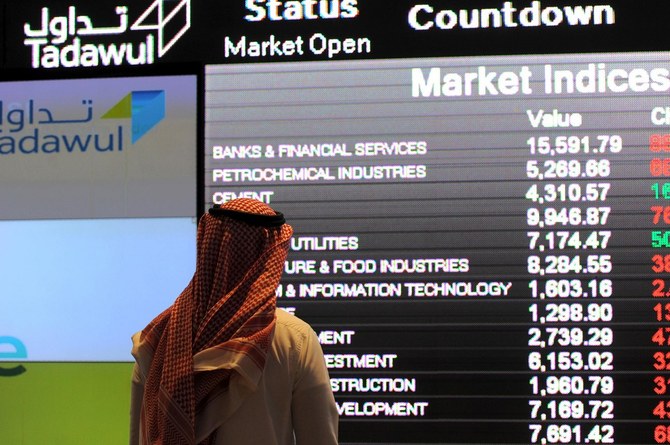
RIYADH: Saudi Arabia’s Tadawul All Share Index ended the week by gaining 6.68 points, or 0.05 percent, to close at 12,352.33 on Thursday.
The total trading turnover of the benchmark index was SR6.55 billion ($1.74 billion) as 120 stocks advanced, while 103 retreated.
The parallel market, Nomu, also gained 95.60 points, or 0.36 percent, to close the trading session at 26,457.81. This comes as 29 stocks advanced, while as many as 27 retreated.
On the other hand, the MSCI Tadawul Index slipped by 2.37 points, or 0.15 percent, to close at 1,547.20.
The best-performing stock on the benchmark index was Al-Baha Investment and Development Co., as its share price surged by 7.69 percent.
Other top performers included Raydan Food Co. and the Company for Cooperative Insurance, whose share prices soared by 7.29 percent and 6.63 percent, to stand at SR30.90 and SR160.80 respectively.
Electrical Industries Co. and the Mediterranean and Gulf Insurance and Reinsurance Co. also fared well during the last trading session of the week.
The worst performer was Saudi Chemical Co., whose share price dropped by 5.36 percent to SR7.77.
Power and Water Utility Co. for Jubail and Yanbu as well as the National Company for Glass Industries, underperformed as their share prices dropped by 5.22 percent and 4.82 percent to stand at SR63.50 and SR42.45, respectively.
On the announcements, Bank AlJazira announced its interim financial results for the period ending March 31 with net profit amounting to SR300.4 million compared to SR279.3 million in the previous quarter.
In an official statement on Tadawul, the bank attributed the increase in the net income to a decrease in total operating expenses by 6 percent.
“The decrease in total operating expenses is mainly due a decrease in net impairment charge for financing and other financial assets, other general and administrative expenses, salaries and employee-related expenses and other operating expenses against an increase in depreciation and amortization expenses,” the statement said.
Conversely, there has been a slight decrease of 0.2 percent in total operating income, primarily attributed to a reduction in net financing and investment gains. Additionally, the rise in net income was partially tempered by increased zakat charges over the period.



